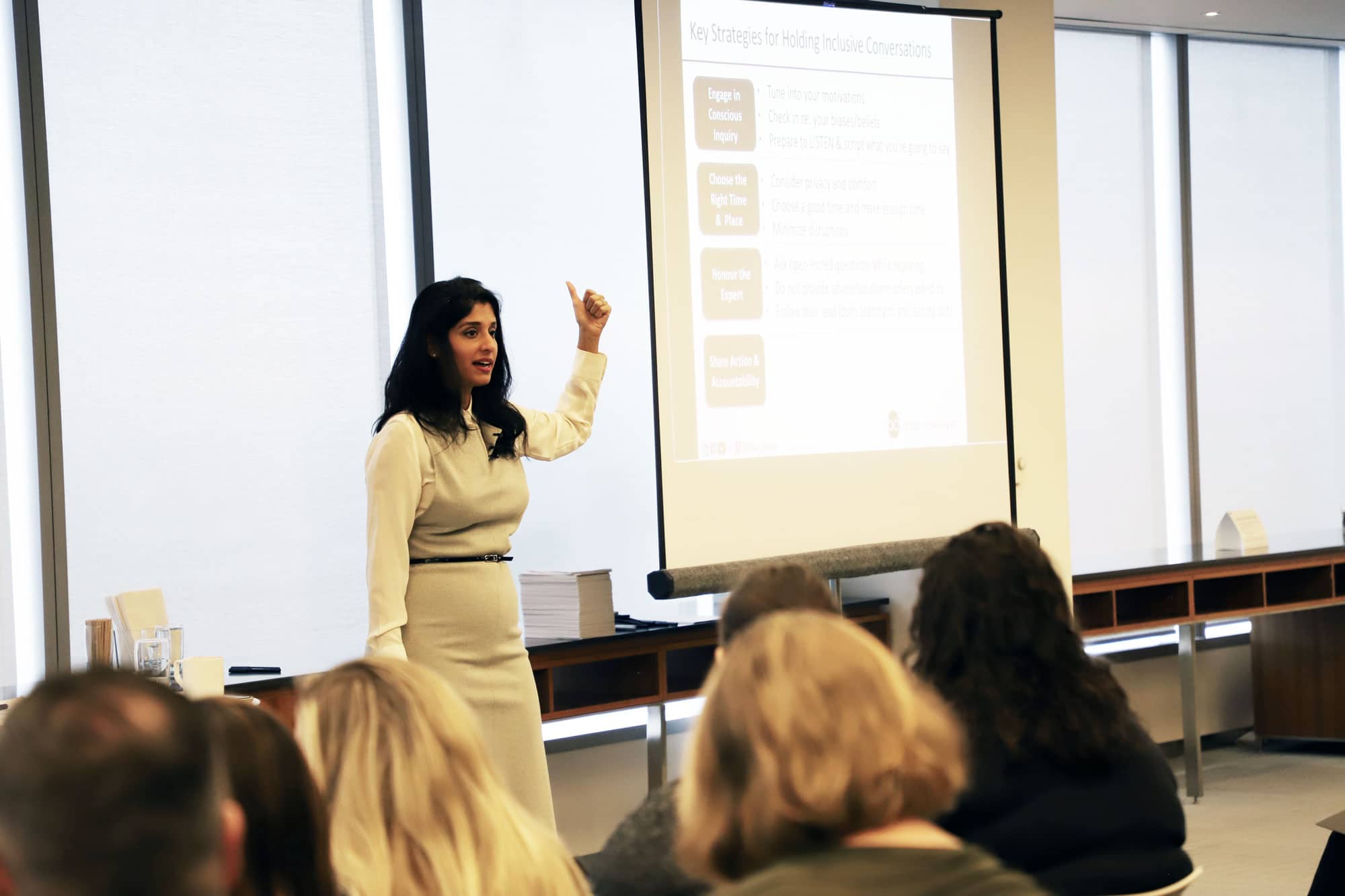
While May marks Mental Health Awareness Month (or Mental Health Awareness Week, depending on where you live), I’d say that over the last year mental health inclusion has been on my mind non-stop. This is due to a few reasons – my own journey in managing work-related stress and experiencing diminished mental health due to COVID and the racial injustice crisis, consistently hearing from clients about how underequipped they feel to address mental health inclusion in their workplaces and the staggering data about the sharp incline in mental health challenges being experienced by people everywhere.
Two years ago now, I co-facilitated bci’s first Breaking Barriers speaking event about mental health inclusion with our resident mental health inclusion expert Komal Bhasin (pictured above, who is also my fab sister!). In this workshop, Komal and I did a deep dive into what to say in order to hold inclusive mental health conversations in the workplace, emphasizing that leaders must do a better job of normalizing conversations around mental health challenges and be more inclusive in how they behave in order to interrupt mental health biases.
At that time, Komal and I knew we were on to something in pushing the dialogue about mental health inclusion, but we certainly couldn’t have predicted what was to come.
Flash forward to where we are now, more than a year into a global pandemic and nearly a year into a game-changing racial justice movement — both of which are taking a huge toll on people’s mental health. I’m sure that you’ve noticed that mental health, burnout and wellness are very common areas for discussion in the workplace right now.
Although more and more organizations are looking to incorporate inclusive mental health strategies into their DEI efforts, we’re still repeatedly hearing that more guidance is needed on how to make this happen. We’re also hearing from leaders about how they can be more inclusive as it relates to mental health, on an individual level.
So to both these ends, I wanted to highlight three things you can be doing to cultivate mental health inclusion:
As part of bci’s commitment to mental health inclusion, we’ve created several new workshops to provide ground-breaking tools and strategies to help support your organization’s mental health inclusion efforts. If you’re interested in hearing more about our mental health programming, please email silvia@bhasinconsulting.com.
Finally, I encourage you to be proactive and vocal about your mental health inclusion efforts in the workplace, and I hope that you’ll continue your advocacy all year long. It’s key for interrupting the stigma around mental health challenges, which will benefit us all as we move forward from this difficult moment.
Sign up for bci’s mailing list to get the latest diversity, equity and inclusion insights right to your inbox every month.
Komal is bci’s Senior DEI Consultant and Mental Health Expert-in-Residence and an accomplished DEI facilitator, coach, and strategist. Komal has over 20 years of experience in providing strategic and advisory guidance and program development across a range of sectors, with a particular concentration in mental health and racial inclusion. Komal is also the founder of Insayva Inc., a social enterprise focused on providing accessible DEI and health equity support to charities and non-profit organizations.
Komal has extensive experience in creating and delivering programming in a range of leadership and DEI areas, including mental health inclusion, psychological safety, empathy, relationship repair, allyship, and cultural competence. She is passionate about driving transformational change in workplaces and has worked closely with bci clients – corporations, professional service firms, health care providers, and educational institutions – to embed cultures of inclusion within their organizations.
Komal has provided one-on-one inclusion coaching to hundreds of senior leaders and brings a unique approach that is informed by her background as a therapist. She is able to expertly handle sensitive conversations and situations and works with leaders to develop the knowledge and skills necessary to advance racial/ethnocultural, gender, and mental health-related equity across teams and organizations. Komal also offers a performance coaching program designed specifically for BIPOC leaders. This program aims to help BIPOC leaders harness their place, position, and identity to thrive in the workplace and beyond. Komal is a qualified administrator of the Intercultural Development Inventory (IDI).
As bci’s Mental Health Expert-in-Residence, Komal offers tremendous expertise around workplace mental health. As a doctoral trained mental health clinician, certified health executive, and registered social worker, Komal has assisted organizations looking to advance employee mental health inclusion and well-being through offering programming on inclusive dialogue, anti-stigma, burnout prevention, psychological safety, resilience, and self-care. Komal is committed to advancing mental health and wellness across the life course; she currently serves on the board of the Alzheimer’s Society of Ontario and previously served on the boards of Children’s Mental Health Ontario and the YMCA of Greater Toronto.
When Komal is not working, you’ll find her painting, cooking, or snuggling with her cats.